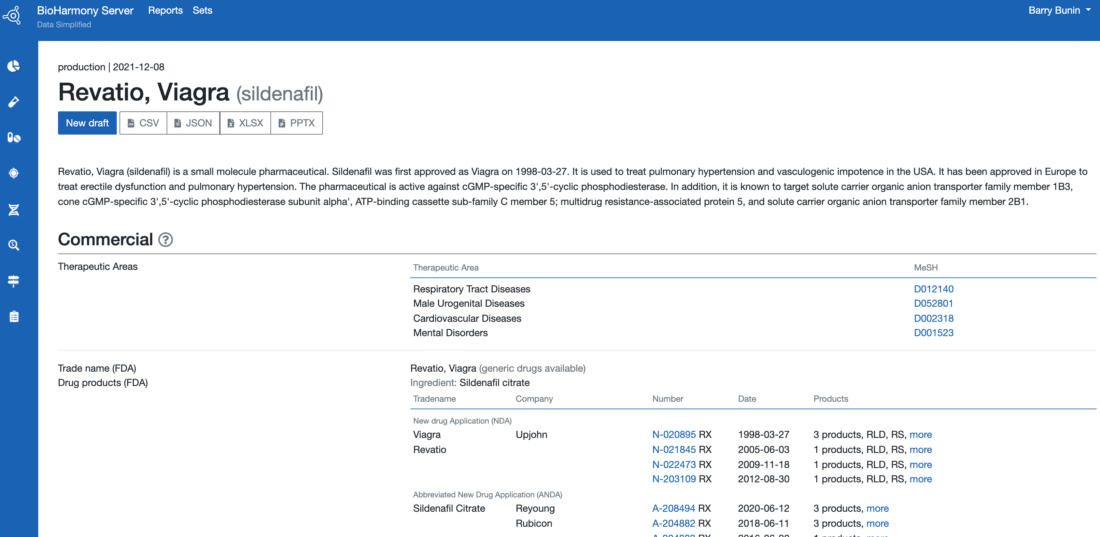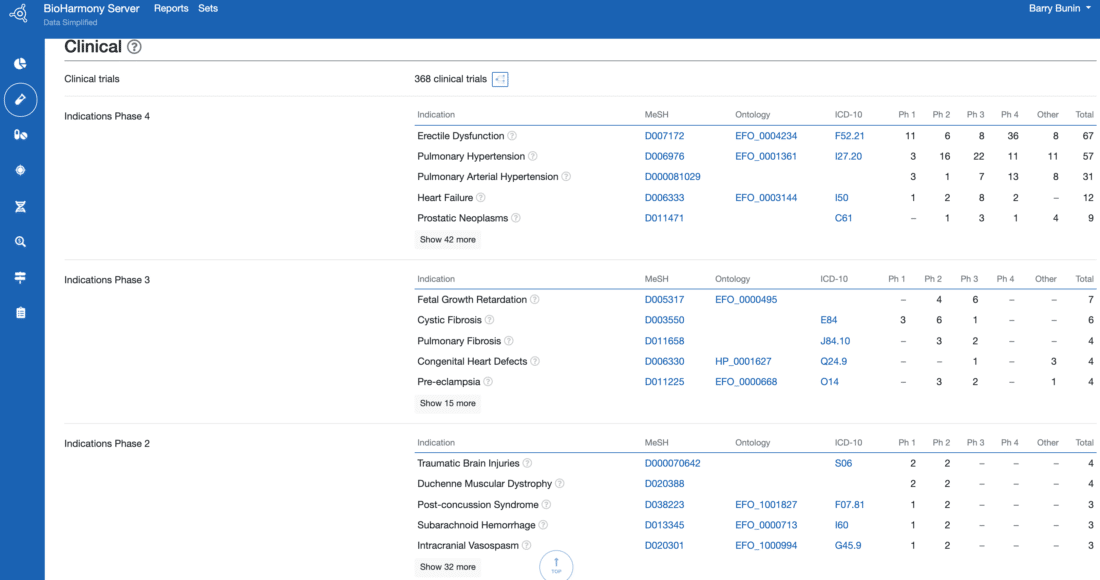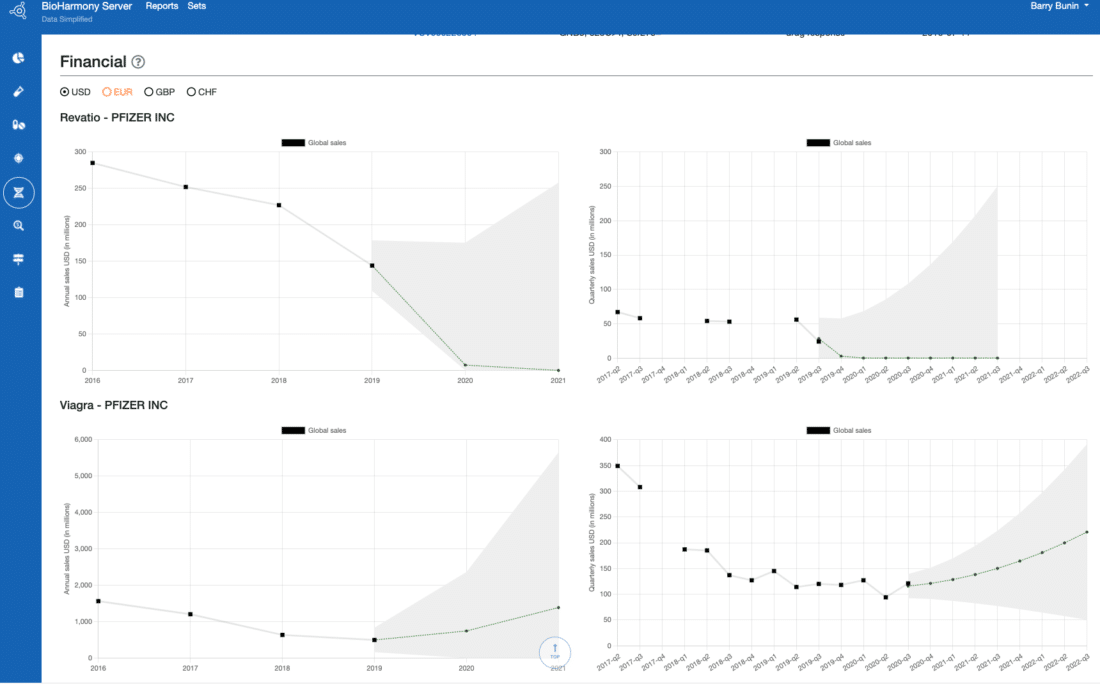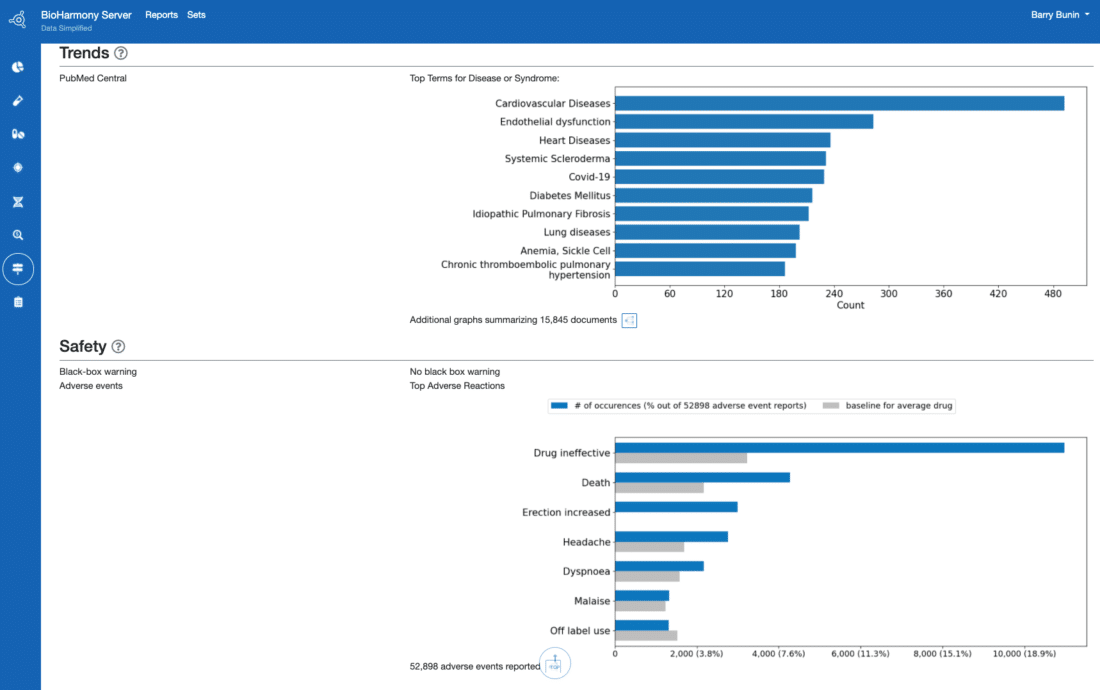 Barry Bunin, PhD
Barry Bunin, PhD
Founder & CEO
Collaborative Drug Discovery
Creating Memories with the Little Blue Pill. FIERCE Biotech carries an article headlined "Could Viagra Prevent and Treat Alzheimer's? Cleveland Clinic Team Shows its Potential." The article reads in part: "The Cleveland Clinic researchers screened a database of 7 million patients and found that Viagra use corresponded with a 69% lower incidence of Alzheimer's disease. Further studies using patient-derived stem cell models demonstrated that the drug targets tau, one of the proteins implicated in Alzheimer's, they reported in the journal Nature Aging." The Cleveland Clinic team was searching for drugs that targeted both tau and amyloid proteins. The article explains: "They used a gene-mapping network to screen about 1,600 FDA-approved drugs, assigning higher scores to compounds that targeted both amyloid and tau. Viagra came out on top." Feixiong Cheng, Ph.D., a researcher in Cleveland Clinic's Genomic Medicine Institute, says the Cleveland Clinic is planning a phase 2 trial of Viagra in Alzheimer's patients, and suggests that the drug-screening method his team used could be applied to repurposing FDA-approved drugs in other neurodegenerative diseases such as Parkinson's.
Interestingly, in CDD's new BioHarmony Drug Data Reports, one can get up to the day latest information on all EMA and FDA approved drugs. Here is the "data simplified" information on sildenafil (Viagra) from BioHarmony across the post approval, clinical, and development spectrum:

Viagra: Post Approval information

Viagra: Clinical Pipeline and Epidemiological Semantic Data

Viagra: Financial data (post generics)

Viagra: Trends and Safety Data (relative to an "average" drug safety profile)
All the drugs information will be available at a price anyone can afford at www.biometadata.com.
* * *
"How AI Is Aiming at the Bad Math of Drug Development." That's the headline in a recent article from Bloomberg about the value of AI in reducing the false starts that result in so many experimental medicines failing during the various stages from drug discovery and development through to animal and human trials. The article says drugmakers and investors are spending billions of dollars to turbocharge the search for new treatments using artificial intelligence, noting: "Scientists are looking to discover breakthrough medicines by rapidly identifying new compounds and modeling complex mechanisms in the body, and by automating what used to be manual processes." The goal is to bring heavy duty computation to identify proteins and other structures of interest from blood, tissue, and DNA databases. In addition to crunching data, AI and automation can help in the lab. Bloomberg reports: "Robots can apply thousands of potential drugs to various types of diseased cells in hundreds of thousands of miniature experiments. AI can be used to process millions of images of the cells-more than humans could ever review on their own-to predict whether experimental therapies appeared to disrupt the disease without harming healthy cells." Those who are really doing drug discovery, can easily separate the wheat from the chaff, the hype for the substance. A famous truism is that each new technology gets overhyped in the short-term, and underappreciated in the long-term. CDD has compared open source models with commercial ones, co-published the scope and limitations for ADME applications with Pfizer here, and donated algorithms to the CDK OS toolkit here.
* * *
"Google's Parent Launches a Company Dedicated to Drug Discovery." That's the headline from a New York Times story about Alphabet's new company called Isomorphic Labs and its plans to build on recent research from DeepMind, a London-based artificial intelligence lab also owned and operated by Alphabet. The article reads in part: "Last year, DeepMind unveiled a system that automatically predicts the shapes of enzymes and other proteins, the microscopic mechanisms that drive the behavior of all living things. The system, called AlphaFold, could make those predictions with an accuracy well beyond other technologies, according to independent tests, and it could play an important role in drug discovery." The Times reports the lab recently released predicted shapes of more than 350,000 proteins, a kind of map for biological processes in humans and other organisms.
* * *
Derek Lowe Provides a Nice Overview of What AI Should Mean to Drug Discovery. With all the news continuing to emerge about the promise of AI for drug discovery, Derek Lowe's blog on Science.org provides a bit of grounding. He begins: "We're to the point that there are several compounds entering the clinic that are billed as having been designed by AI techniques. I'm always saying that I'm a short-term pessimist and a long-term optimist about this sort of thing . . . One thing to keep in mind is that there is (famously) no standard definition for AI itself." He explores the spectrum of how AI can help, writing: "We've moved down from the godlike heights of 'Go cure this disease this way,' but believe me, a software system that even managed to say 'Here's a completely new ligand class for Known Target Y' would be impressive. New chemical matter is not only patentable, but it has new properties-different pharmacokinetics, different selectivity, different toxicity-and different can be better."
* * *
Celebrating the Centennial of Insulin's Discovery. Drug Discovery News carries an interesting and inspiring article headlined "100 Years of Insulin: From Discovery to Delivery," to celebrate the discovery of insulin back in 1921 by surgeon Frederick Banting and medical student Charles Best. (Two years later they would share the Nobel Prize for that discovery.) The article provides a look at the milestones we've passed along the way: from the discovery in 1936 (again by Banting & Best) that there were two types of diabetes, through insulin molecular studies in the 1950s, to the biosynthesis of insulin in the 1960s, the development of synthetic insulin in the 1970s, insulin analogs in the 1980s . . . clear through to the more efficient insulin delivery systems of today. As we struggle each day to discover drugs to advance the state of medicine, it is heartening to look back at what we've accomplished with insulin. The Drug Discovery News article concludes: "In the last 100 years, the study of insulin as a treatment for diabetes has altered the lives of countless people, defined new fields of research, and propagated further discovery."
=
Barry A. Bunin, PhD, is the Founder & CEO of Collaborative Drug Discovery, which provides a modern approach to drug discovery research informatics trusted globally by thousands of leading researchers. CDD Vault® is a hosted biological and chemical database that securely manages your private and external data.


